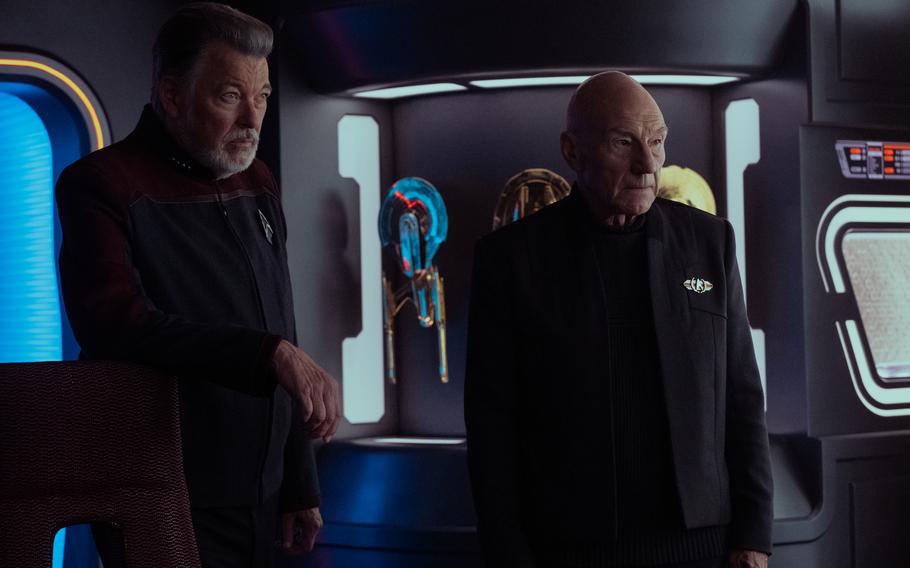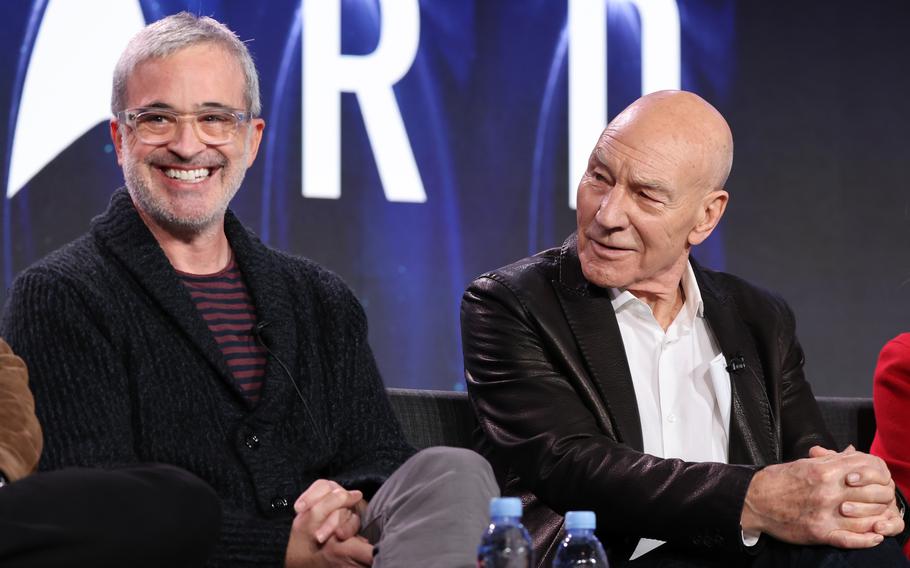
Patrick Stewart, right, returns as Capt. Jean-Luc Picard in the third and final season of the Paramount+ series “Star Trek: Picard.” Also pictured: Jonathan Frakes, who plays William Riker. (Paramount+)
When Patrick Stewart was first offered the role of Capt. Jean-Luc Picard in a “Star Trek” adventure, he had no clue what that was. He had to ask his children.
“I got this famous call from my agent, whom I had never met, who said, ‘I’ve got two questions for you, Patrick. What were you doing at UCLA last night? And why should Gene Roddenberry want to see you this morning?’ That was the beginning of it,” he recalls. “And then I had to turn to my kids ... and say, ‘Kids, kids. I think you watch “Star Trek.” Tell me about it. What was it? Did you like it? Was it any good at all?’ And, of course, they raved about it.
“And I remembered coming home after matinees from the Royal Shakespeare Theatre just in time to be able to give my kids their supper and read to them and put them to bed before going back to do an evening performance. And I would find that they were watching this thing on television with these guys in colored T-shirts. And that’s all I remember.
“I knew nothing about it, and I did not even recall the name Gene Roddenberry (“Star Trek’s” creator.) So I had a lot to catch up on. But as time went by, I began to see that ‘Star Trek: The Next Generation’ cast, crew, producers, writers, directors, were creating an expansion of Gene’s world. And that has continued until today.”
It was 1987 when Stewart first slipped into Picard’s tights and seized command of the USS Enterprise. And starting Feb. 16 he’s back at it on Paramount+. “Star Trek: Picard” returns for its third and final season complete with the crew from “Star Trek: The Next Generation,” including LaVar Burton as Geordi La Forge, Gates McFadden as Dr. Beverly Crusher, Jonathan Frakes as William Riker, Brent Spiner as the android Data’s evil twin brother Lore, Marina Sirtis as Deanna Troi and Michael Dorn as Worf. Returning from previous “Picard’s” are Jeri Ryan as Seven of Nine and Michelle Hurd as Raffi Musiker.
Stewart wasn’t sure that he wanted to return to the character for this final season.
“The most important thing for me was that it should not just simply look like a three-series reunion, because that would just simply be stepping back,” he says. “And what excited me about starting work on ‘Picard’ was that ... I had lived nearly 35 years since I first put on the captain’s uniform. And there is no doubt that in that time, the world has changed. But I have changed too. I’m not the same person that I was then. If I were, they would never have cast me.
“And I wanted the series to show the impact of those years that had passed and how much one might change — and whether fears become greater or less. Right now, about the condition of the world, my fears are high and full of anxiety. So I wanted that to be incorporated.”
Fears and anxieties of today may be part of the substructure of Season 3, but the series remains true to the original “Star Trek” ethos, says executive producer Alex Kurtzman.

“Star Trek: Picard” Executive Producer Alex Kurtzman and actor Patrick Stewart speak on stage during the show’s TCA Paramount+ panel at The Langham Huntington on Jan. 9 in Pasadena, Calif. (Randy Shropshire, Getty Images/Paramount+)
“Changing it doesn’t mean changing the essential nature of what ‘Trek’ is,” he says. “So for us, that’s always about Roddenberry’s vision of optimism. It doesn’t mean you can’t go into dark places. It just means that optimism is the core tenet of ‘Star Trek.’
“I always personally feel like canon is a wonderful thing. You have to respect it, but in order to grow it, you have to make changes. You have to explore the gray areas the canon has maybe hinted at, but not fully explored. And that is very exciting.”
Stewart, 82, says he doesn’t mind portraying an aging Picard.
“Actors’ lives are unusual. Sometimes I feel that it is little different than a 5-year-old’s playroom, what we do. And other times what we do is perhaps a little more grown-up and a little more serious. But we are essentially always examining the inside of ourselves. We ask questions not only about the character, but what’s in here,” he says, pointing to his heart. “Acting is the only way I’ve discovered to fully express myself. Perhaps if I weren’t an actor I’d be a teacher. As a very inarticulate teenager, I found that acting gave me an opportunity to say things about myself, about the world and about my life which I know I could not have said myself. I know that now. At the time, I was just having fun. It was a legitimate reason to go out in the evening, be out of the house — I was rehearsing a play. And it was no coincidence that some of the prettiest girls I knew were also amateur actresses.”
Stewart credits the positive values of the “Star Trek” saga for its success.
“I changed my views about how we should continue ‘Picard’ into Season 2 and 3 because I saw how effective Season 1 was. And that it was largely effective, I felt, because of its examination of the nature of change, of growth.
“And growth — whether it’s up or down — that is the world that we live in. And may he rest in peace, that is, ever since Gene first created the essential elements of what ‘Star Trek’ is, because they (those values) remain. We respect them. We hold on to them and continue to pursue them because I believe and I think I’m surrounded by people who believe the same thing: Our world needs them.”